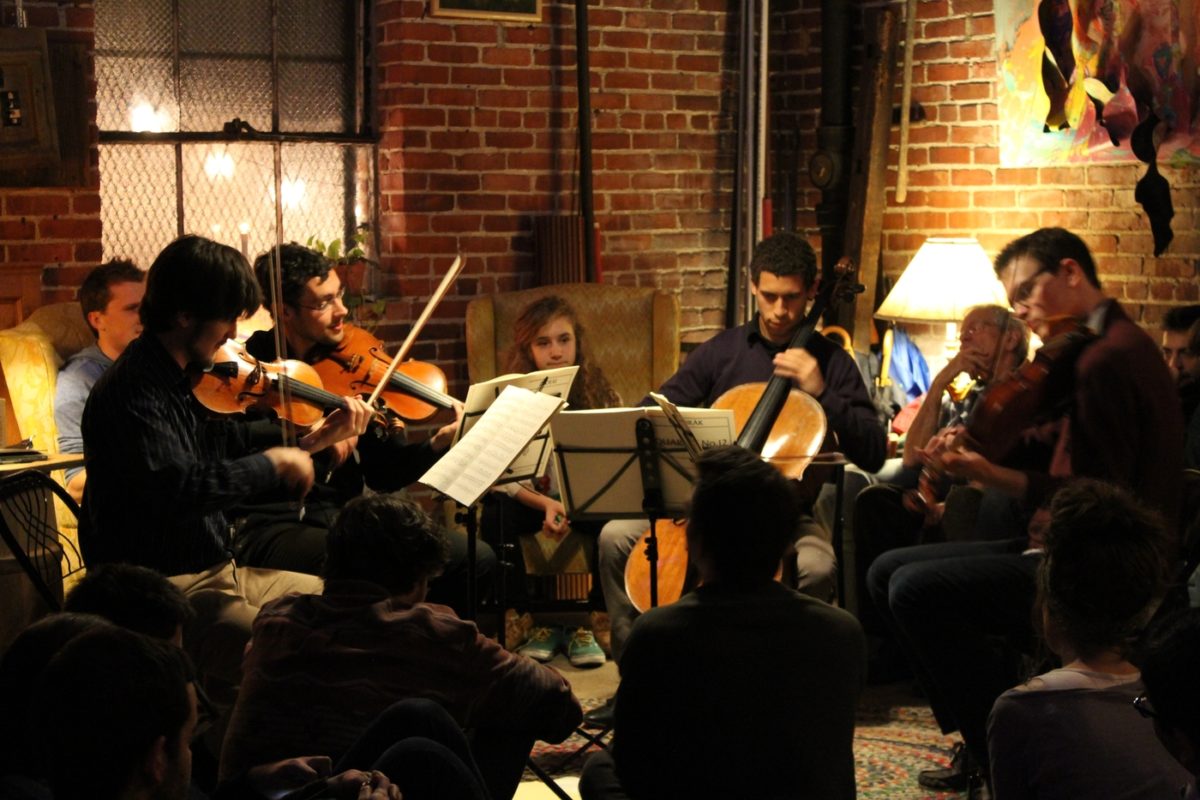Sam Bodkin believes that young people want more out of culture and art.
“They want more out of their lives,” says Bodkin, the 27-year-old Bed Stuy-based founder and CEO of Groupmuse, during our phone interview.
Groupmuse hopes to be the bridge for millennials to cross over when classical music piques their interest. The startup transforms living rooms into mini concert halls. For example, tonight, you could watch a pair of conservatory grads play Mozart’s Duo for Violin and Viola in G major in an apartment in Prospect Lefferts Garden.
“We will have dranks and some light snax,” tonight’s host wrote on Groupmuse. “Bring more if you wish! But definitely bring your $10, if you don’t have Venmo.”
Audience members pay $10 or more, which goes to the musicians, plus a $3 RSVP fee, which Groupmuse pockets.
When Bodkin realized how much classical music contributed to his life, he wanted millennials to experience the same, particularly during this “bleak cultural moment where Kim Kardashian is our touchstone of a cultural icon.”
“That was when I came to believe that classical music had something very special to offer,” he says, “and that was when I decided that I was going to devote my life to trying to get more people into this form of music.”

A different kind of house show. (Courtesy photo)
Along with his elementary school friend Ezra Weller and developer Kyle Schmolze, Bodkin founded GroupMuse after graduating from Columbia University in May 2012 with a degree in political science. Since then, the startup has been featured in the Wall Street Journal, Time and Wired.
Bodkin says that a crucial part of their mission is community building and creating connections between people who don’t yet know each other through the shared experience of music.
“In each Groupmuse, there are new social groups that collide,” he says.
The average Groupmuse attendance is 25 people, but they’ve had audiences as big as 600 people. Audience members are usually millennials.
Though the founding team originally started the company in Boston, they all now work in different cities. Weller, a New England Conservatory grad whom Bodkin describes as a “a very fine trumpet player and composer,” remained in Boston, while Bodkin moved to New York and Schmolze moved to San Francisco. Another teammate, Ben Miller, recently left Crown Heights for Berlin. They’re each working to spread Groupmuse to their respective cities.
They have a community of musicians that are always willing to play because, as Bodkin puts it, “the money is good and the vibe is wonderful.”
“It’s an opportunity to share his or her art to eager listeners,” he added.
New York City is the most active city in terms of hosting Groupmuse, followed by Boston and San Francisco. “Brooklyn is specifically the most active out of all the boroughs,” Bodkin says, with 60 percent of concerts happening in Brooklyn and the rest in Manhattan, with a smattering in the Bronx and Queens.
Even so, Bodkin wouldn’t say that Groupmuse is headquartered in New York City, although it is where they have the most events.
The company’s reveue model relies on the $3 RSVP fee, plus the following initiatives:
- Massivemuses, or larger Groupmuse concerts hosting 250 people, instead of 20.
- Nights Out, the company’s first effort to bring millennials into existing concert halls at a discounted price. Partners include the New York Philharmonic, The Orchestra of St Luke’s, Chamber Music Society of Lincoln Center and National Sawdust.
- Supermusers, a loyalty program with perks like RSVP fee waiver, discounted tickets and priority registration for Nights Out.
Next, Groupmuse plans to expand to cities like Los Angeles, Chicago and Philadelphia.
When asked what was most surprising about starting Groupmuse, Bodkin thinks it is the overwhelmingly positive response the platform has garnered.
“People have really just said classical music is on death’s door and that it’s never really gonna figure itself out,” he said. “It did not take long for Groupmuse to prove that wrong.”
Join our growing Slack community
Join 5,000 tech professionals and entrepreneurs in our community Slack today!
Donate to the Journalism Fund
Your support powers our independent journalism. Unlike most business-media outlets, we don’t have a paywall. Instead, we count on your personal and organizational contributions.
